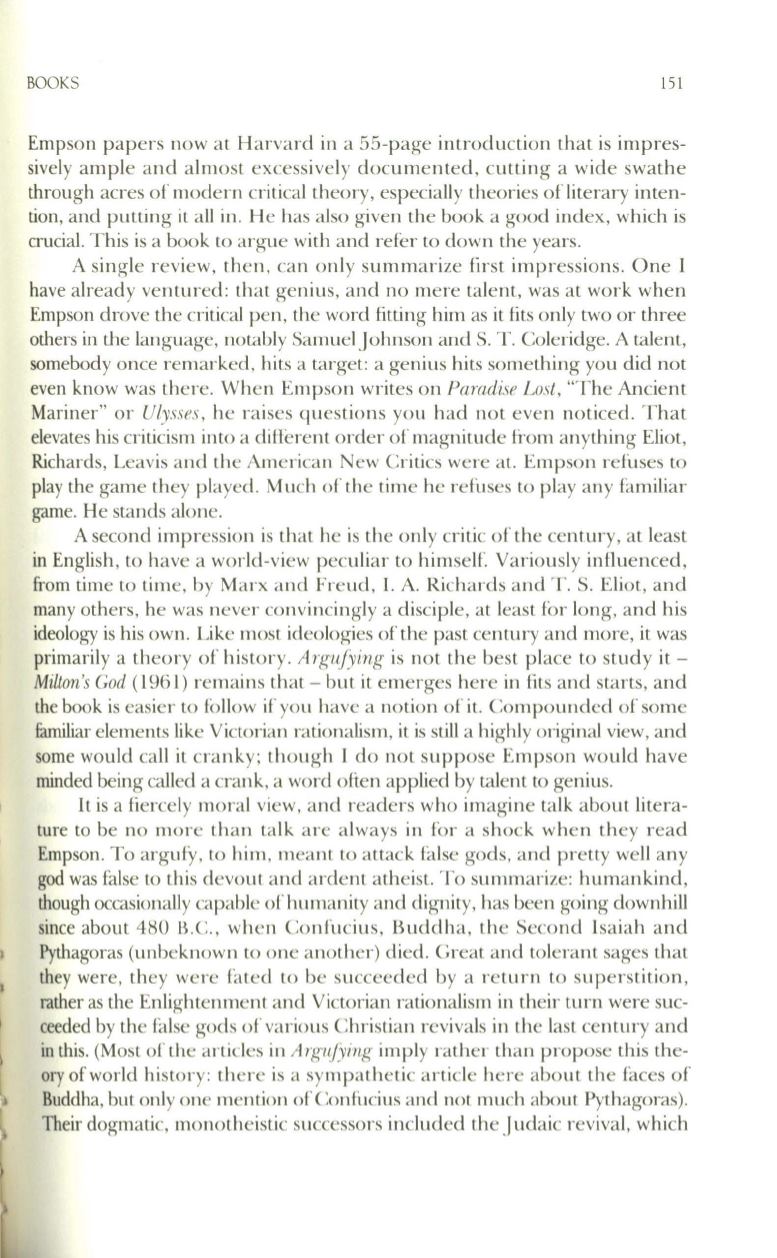
BOOKS
151
Empson papers now at Harvard in a 55-page introduction that is impres–
sively ample and almost excessively documented, cutting a wide swathe
through acres of modern critical theory, especially theories ofliterary inten–
tion, and putting it all in . He has also given the book a good index, which is
crucial. This is a book to argue with and refer to down the years.
A single review , then, can only summarize first impressions. One I
have already ventured: that genius, and no mere talent, was at work when
Empson drove the critical pen, the word fitting him as it fits only two or three
others in the language, notably Samuel Johnson and S.
1'.
Coleridge. A talent,
somebody once remarked, hits a target: a genius hits something you did not
even know was there. When Empson writes on
Paradise Lost,
"The Ancient
Mariner" or
Ulysses,
he raises questions you had not even noticed . That
elevates his criticism into a different order of magnitude from anything Eliot,
Richards, Leavis and the American New Critics were at. Empson refuses to
play the game they played. Much of the time he refuses to play any familiar
game. He stands alone.
A second impression is that he is the only critic of the century, at least
in English , to have a world-view peculiar to himself. Variously influenced,
from time to time , by Marx and Freud ,
I.
A.
Richards and
T.
S. Eliot, and
many others, he was never convincingly a disciple, at least for long, and his
ideology is his own. Like most ideologies of the past century and more, it was
primarily a theory of history.
Arguj'!ing
is not the best place to study it–
Milton's God
(1961) remains that - but it emerges here in fits and starts, and
the book is easier to follow if you have a notion of it. Compounded of some
fumiliar elements like Victorian rationalism, it is still a highly original view, and
some would call it cranky; though I do not suppose Empson would have
minded being called a crank, a word often applied by talent
to
genius.
It
is a fiercely moral view, and readers who imagine talk about litera–
ture to be no more than talk are always in for a shock when they read
Empson. To arguty, to him, meant to attack false gods, and pretty well any
god was false to this devout and ardent atheist. To summarize: humankind,
though occasionally capable of humanity and dignity, has been going downhill
since about 480
B.C .,
when Confucius, Buddha, the Second isaiah and
Pythagoras (unbeknown
to
one another) died. Great and tolerant sages that
they were, they were fated to be succeeded by a return
to
superstition,
rather as the Enlightenment and Victorian rationalism in their turn were suc–
ceeded by the false gods of various Christian revivals in the last century and
in
this. (Most of the articles in
Argufying
imply rather than propose this the–
ory of world history: there is a sympathetic article here about the faces of
Buddha, but only one mention of Confucius and not much about Pythagoras).
Their dogmatic, monotheistic successors included the Judaic revival, which


